Coral reefs worldwide are facing global and local threats that lead to dramatic coral cover reductions. Infectious diseases have contributed to this massive coral loss by disrupting reproductive connectivity and natural recruitment, which are essential for reef resilience. To provide guidance to address this pressing challenge, CORDAP released a complete roadmap that reviews the current state of knowledge about coral diseases, identifies critical gaps, and suggests paths to move forward in the combat against these diseases.
This roadmap was prepared by 13 scientists from 11 institutions spread across the globe, following a workshop co-organized by CORDAP, KAUST, CORALIUM and the Universidad Nacional Autónoma de Mexico (UNAM), in Riviera Maya, Mexico in 2024. The workshop brought together 25 experts researching different aspects of infectious diseases and coral reef ecology.
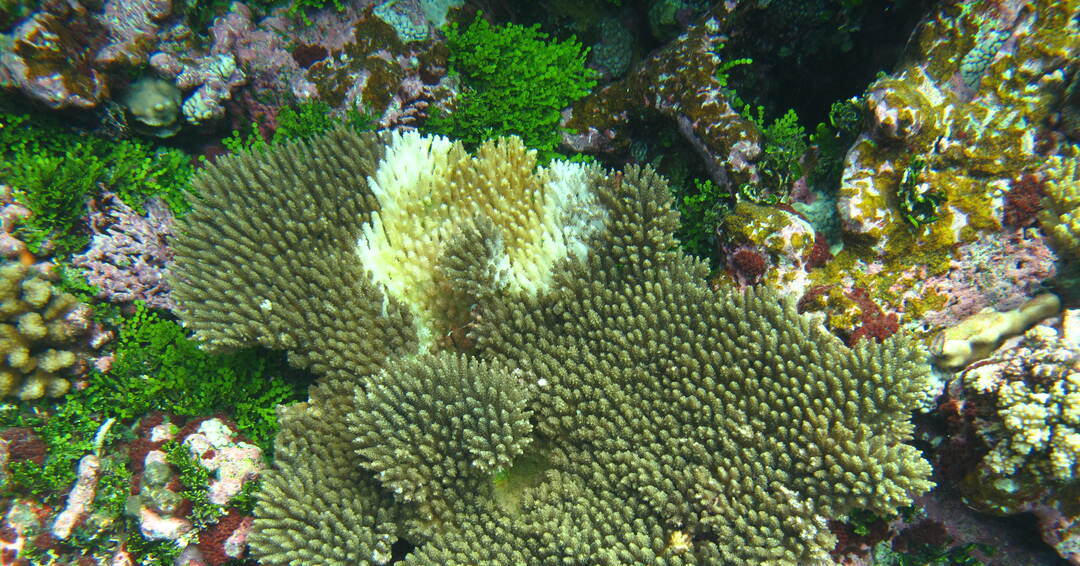
Coral diseases. Photo: Great Aeby.
Coral diseases: what we know
In recent decades, coral diseases have emerged as a major threat to the health and functionality of coral reefs. The increasing frequency and intensity of disease outbreaks have triggered mass mortality events and drastically reduced live coral cover, resulting in significant biodiversity loss and the widespread degradation of these ecosystems. Since their emergence, coral disease outbreaks have proven to be complex phenomena influenced by multiple biotic and abiotic factors.
Various pathogens, including bacteria, fungi, protozoa, and viruses, have been associated with coral diseases, with significant contributors being Vibrio spp. and Roseofilum spp., among other bacterial groups. Based on their pathological manifestations, coral diseases can be broadly classified into three major categories:
- Growth anomalies: coral diseases characterized by abnormal proliferation of coral tissue, leading to macroscopically visible structures with diverse morphologies, such as nodular formations.
- Pigmentation disorders: abnormal pigmentation changes in coral tissues, often manifesting as dark spots, yellow bands, or diffuse discoloration.
- Tissue-loss diseases: These diseases result in progressive tissue necrosis, exposing the underlying skeleton and often leading to colony mortality.

Timeline of main coral diseases. Infographic retrieved from CORDAP’s Coral Diseases Roadmap.
The knowledge gaps in coral disease research
There is still a lot to study and understand about coral diseases, but also about how to diagnose and manage these threats. These knowledge gaps range from taxonomic and methodological aspects to deficiencies in understanding fundamental ecological and physiological interactions, and are listed below:
1. Insufficient integration of advanced genomic approaches
Research on coral diseases has advanced significantly over the past decade and is now transitioning from macroscopic observations to advanced genomic approaches that help better understand coral-microorganism interactions. Still, many aspects of coral pathogenesis remain speculative, partly due to the complexity of the symbiotic relationships involved.
2. No standardized nomenclature
Despite some recent advancements, inconsistencies persist in describing macroscopic signs and in the terminology used to identify coral diseases and outcomes.
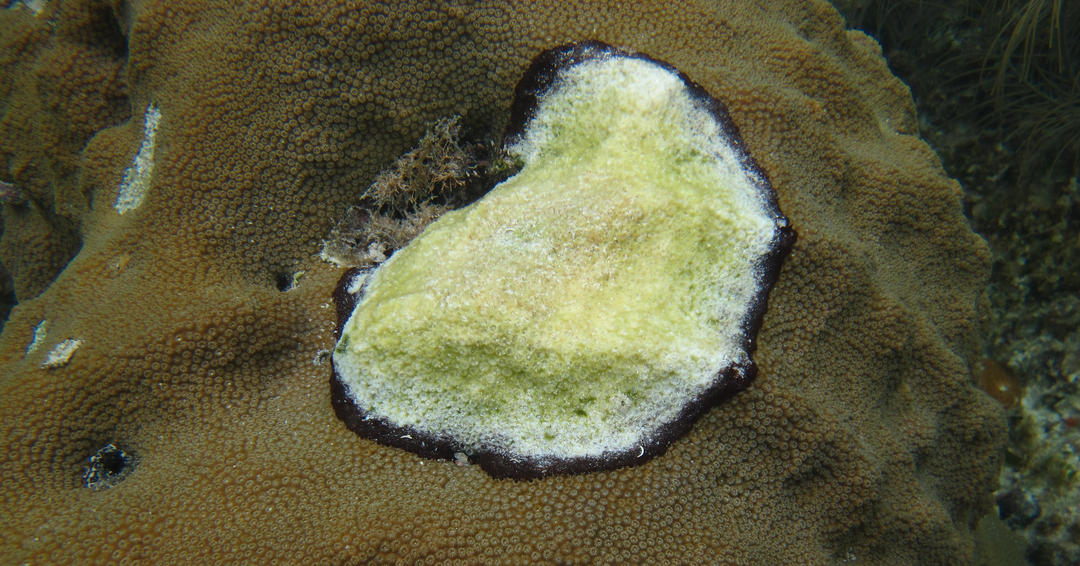
Example of a coral pigmentation disorder. Photo: Christina Kellogg.
3. Absence of standardized monitoring protocols
The inconsistencies surrounding different monitoring protocols hinder data comparison across regions and studies, complicating the identification of global patterns in coral diseases and impeding rapid response efforts to address and manage emerging outbreaks.
4. Poor understanding of the interactions between environmental factors and pathogens
Changing climatic factors and anthropogenic pressures have been linked to the increase in coral disease outbreaks and their virulence, but direct causality is often difficult to establish. Additionally, other environmental factors, such as light intensity, influence the progression of certain diseases, highlighting the need to investigate multifactorial interactions.
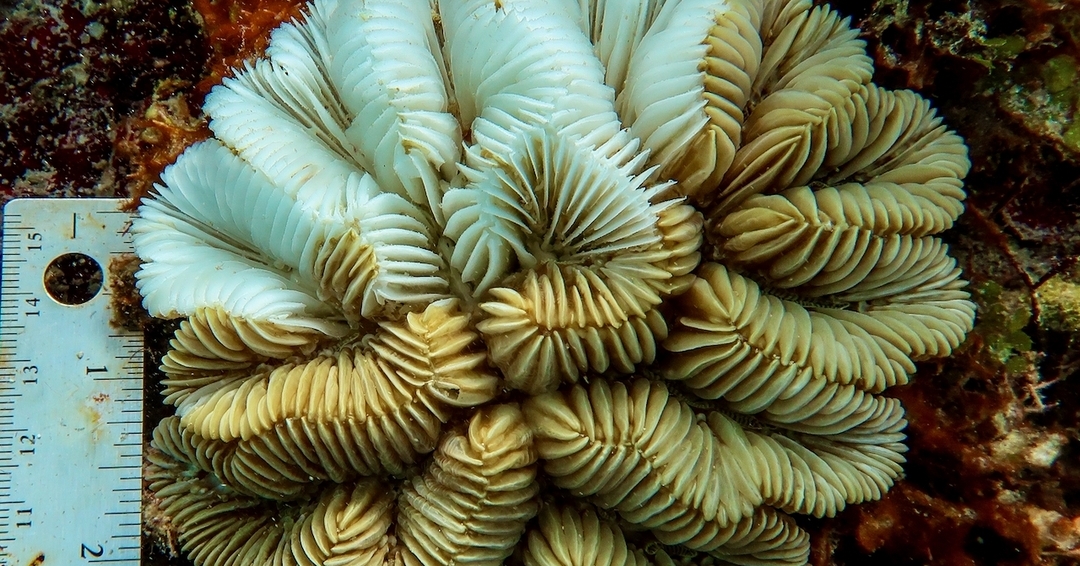
Example of a tissue-loss disease. Photo: Lorenzo Alvarez-Filip.
Guidelines for advancing coral disease research
The growing threat of coral diseases demands urgent action. Coral diseases are now widespread, increasingly severe, and affecting multiple coral taxa simultaneously. These outbreaks are often triggered or exacerbated by environmental stressors such as rising sea surface temperatures, nutrient enrichment, sedimentation, and pollution – creating a positive feedback loop that, in turn, maximizes these impacts. As coral reef degradation accelerates under climate change, mitigating disease impacts is no longer optional, but an essential pillar of reef conservation and restoration strategies. Yet, compared to other stressors such as bleaching or overfishing, disease remains poorly understood, under-monitored, and under-addressed.
To address this gap and effectively manage coral diseases, the scientific community must adopt a transdisciplinary and forward-looking research agenda that focuses on 10 key priorities:
- Foster multidisciplinary collaboration
2. Advance diagnostic and monitoring technologies
3. Design experimental platforms for mechanistic understanding
4. Standardize protocols for coral disease detection, reporting, and response
5. Validate experimental results with field studies
6. Act fast on managing the outbreak
7. Integrate coral disease management into restoration programs
8. Build predictive models of disease emergence and spread
9. Increase education and outreach on the topic
10. Develop and validate new treatments
You can find more details about each key priority in the complete version of our roadmap on coral diseases.
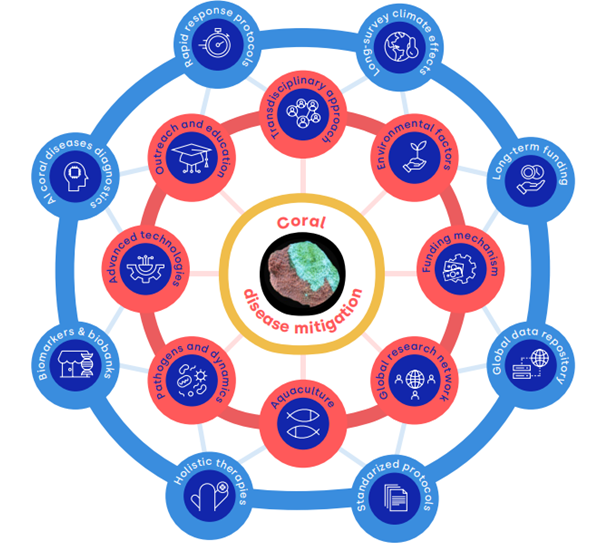
The conceptual diagram represents a holistic framework for addressing coral diseases. Figure retrieved from CORDAP’s Coral Diseases Roadmap.
Broader considerations and conclusions
The complexity of coral diseases requires a paradigm shift in both research and conservation strategies to bridge existing knowledge gaps and develop effective intervention frameworks. To address these gaps, it is crucial to gain a comprehensive understanding of the dynamics of coral diseases across multiple spatial and temporal scales. Thus, future studies must extend beyond localized assessments and establish long-term multiregional monitoring programs that capture the variability in disease prevalence and the environmental stressors triggering different diseases. Integrative approaches at broad geographic scales should be prioritized, combining molecular diagnostics of coral diseases, long-term ecological monitoring, and predictive modeling.
The role of the coral holobiont in disease resistance also remains an underexplored frontier. Therefore, particular attention should be paid to developing analyses that investigate the functional interactions between corals, their microbiomes, and environmental stress factors. This includes targeted investigations into microbial manipulation strategies, such as probiotics, phage therapy and microbial transplants, to enhance coral immunity and mitigate pathogen infections. The implementation of these methodologies should adhere to standardized protocols through global research networks, ensuring data comparability and reproducibility. This will enable researchers to identify epidemiological trends and evaluate the effectiveness of the strategies employed.
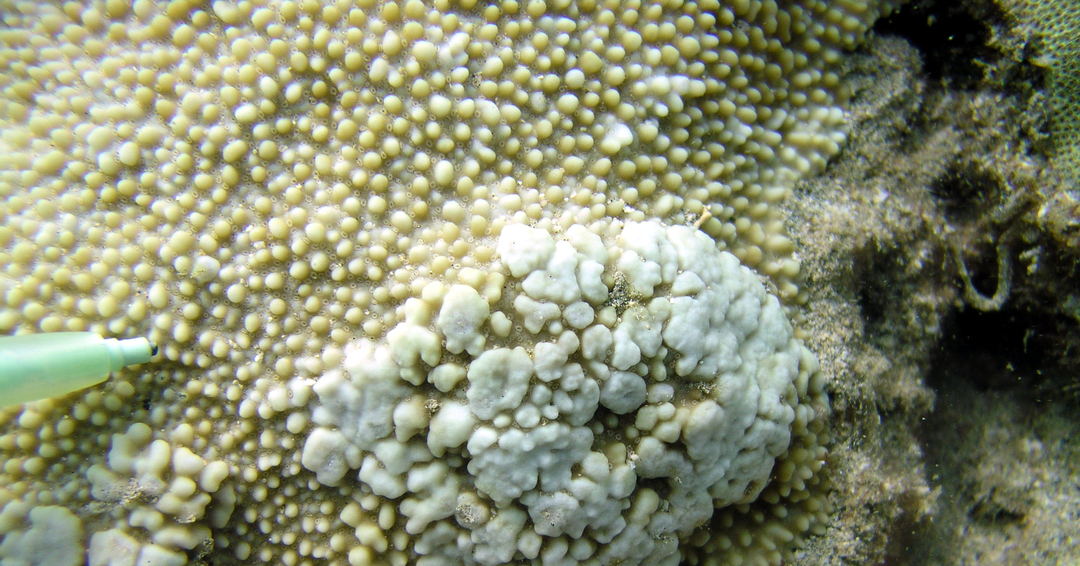
Example of a coral growth anomaly. Photo: Great Aeby.
Finally, an interinstitutional framework is necessary to implement disease mitigation at ecologically relevant scales. Establishing this institutional network will facilitate the creation or enhancement of global data exchange platforms and promote collaboration to accelerate the translation of research findings into viable conservation policies. In conclusion, tackling coral diseases requires a transition from reactive crisis management to proactive intervention strategies grounded in scientific evidence. This can only be accomplished with sustained funding commitments, the integration of traditional ecological knowledge with cutting-edge technological advancements, and the development of adaptive management frameworks that account for the rapid pace of climate change. By systematically addressing the persistent knowledge gaps in coral disease research, the scientific community can progress toward scalable and resilient solutions that protect coral reef ecosystems for future generations.
We invite you to download and read the full R&D Technology Roadmap on Coral Diseases.
You can also learn more about our other scoping workshops and roadmaps.
